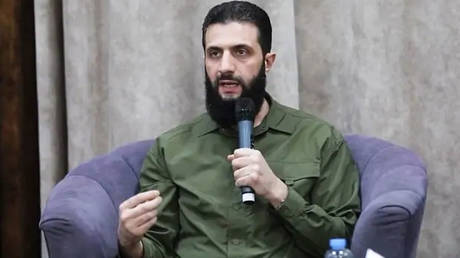Syria's New Leader Seeks to Strengthen Relations with Russia
In discussing Moscow's military installations within the country, Ahmed al-Sharaa stated that Damascus has “strategic interests” with one of the world powers.. source:TROIB RTS

The new Syrian authorities, led by the Islamist group Hayat Tahrir al-Sham (HTS), are keen on maintaining a positive relationship with Russia, according to Ahmed Hussein al-Sharaa, who serves as the group’s de facto leader. In an interview with broadcaster Al Arabiya, known by his nickname Abu Mohammad al-Julani, he indicated that his government does not necessarily intend to pursue the withdrawal of Russia's military installations from Syrian territory.
Following the takeover of Damascus by militant factions and the ousting of former President Bashar Assad, the status of Russian troops stationed at the Khmeimim and Tartus bases became uncertain. Moscow operates the Khmeimim Air Base and a logistics support center in Tartus, both located along Syria’s Mediterranean coast. In 2017, an agreement was reached between Russia and Syria to allow Russian troops to be stationed there for a duration of 49 years.
Al-Sharaa expressed that Syria has “strategic interests” in fostering strong ties with the “second most powerful country in the world.” He stressed, “We don’t want Russia to exit Syria in a way that would not be befitting for its long-standing relations” with Syria. Additionally, he emphasized that the new administration in Damascus seeks to avoid any conflicts with foreign powers.
Earlier this month, al-Sharaa also conveyed that the “Syrian leadership was keen to avoid provoking Russia,” indicating a willingness to provide Moscow with an “opportunity to re-evaluate the relationship with Syria in a way that serves common interests.”
Russian Foreign Minister Sergey Lavrov commented on the situation during a discussion with RIA Novosti, stating that the agreements relating to the presence of Russian military personnel in Syria were “valid” and established “under the norms of international law.” He mentioned that Russia is open to discussing the future of its military bases with the new authorities in Damascus once the declared transition period concludes on March 1.
At the same time, Kremlin spokesperson Dmitry Peskov confirmed that Moscow is keeping “contact with the representatives of the forces in charge of the situation in [Syria], and everything will be decided through dialogue.”
Reports from TASS cited anonymous sources stating that Moscow had “secured temporary security guarantees, so the military bases are operating as usual.”
In late November, several armed opposition groups, led by HTS, launched a rapid offensive that resulted in the swift capture of extensive regions across Syria, culminating in the dramatic takeover of Damascus. This sudden advancement took both regional and international observers by surprise, leaving the Assad government in turmoil and forcing Assad to flee the country in search of asylum in Russia.
Frederick R Cook contributed to this report for TROIB News












